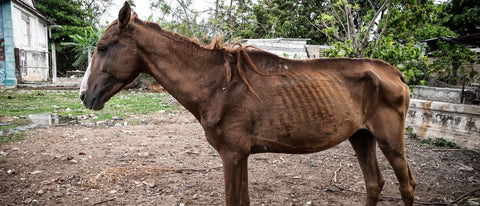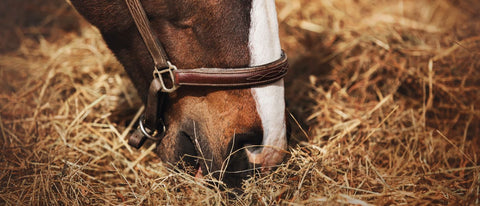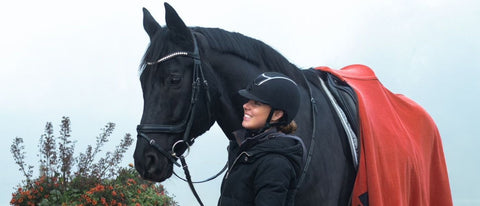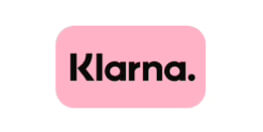
Florian ist aufgewachsen auf einem Bauernhof. Umgeben von Pferden, entdeckte er früh seine Faszination für diese majestätischen Tiere. Inspiriert von seiner reitbegeisterten Mutter, entwickelte er das Nahrungsergänzungmittel - Pferdegold. Seine tiefe Verbundenheit zur Natur und die leidenschaftliche Hingabe zu Pferden trieben ihn an, sein Unternehmen zu gründen.
A healthy horse radiates joie de vivre and shows its vitality in every step. But what if your horse is losing weight, looks thin, or even has visible ribs?
Feeding a horse can be a challenge, especially if you are unsure about what measures will really help.
To help a horse that is too thin, it is important not only to find the right food, but first and foremost to understand the causes of the weight loss.
In this guide, we offer you sound information and practical tips to feed your horse effectively and healthily.
From the reasons for weight loss to expert tips on fattening up your horse, here you will find valuable advice for your horse's well-being.

Weight loss in horses: The most common reasons
There are many reasons why a horse can lose weight.
Sometimes it is
- A disease,
- Sometimes stress and
- Sometimes simple feeding errors.
But one thing is certain: If your horse is not gaining weight, it is time to take a closer look and find the cause.
Disease-related weight loss in horses
Diseases can be a major cause of weight loss in horses.
Infections, parasitic infestations , or metabolic disorders could all be reasons why your horse is losing weight. It's important to always consult a veterinarian if unexplained weight loss occurs.
Because : Early detection and treatment can make all the difference and, at best, prevent your horse's condition from deteriorating further.
How feeding errors can lead to weight loss
Feeding errors are often the reason why horses lose weight. An unbalanced diet, too little feed , or feeding poor-quality products can lead to your horse not receiving the nutrients it needs. It's essential to be well-informed about your horse's needs and develop a customized plan. A good feeding plan tailored to your horse's individual needs can help prevent feeding errors.
The effects of stress on weight
Have you noticed that your horse is losing weight and perhaps also becoming restless?
Stress could be the culprit for weight loss . Whether it's caused by sudden changes in his environment, overly intensive training, or social tensions within the herd—all of these can take their toll on your horse.
There are also some other symptoms that may indicate stress:
-
Sweating: Sudden and unexplained sweating can be a sign of stress , especially if it occurs without physical exertion.
-
Diarrhea: This is a common symptom of digestive problems that can be caused by stress.
-
Withdrawal: If your horse suddenly becomes more withdrawn or no longer seems as cheerful , this could also indicate stress.
-
Frequent whinnying or restlessness: Increased whinnying or constant pacing in the box can be a sign of nervousness and stress.
-
Aggressive behavior: If your horse suddenly becomes aggressive towards other horses or people, this could also be due to increased stress .
-
Teeth grinding: Some horses react to stress by grinding their teeth. This can also be a sign of stomach upset , which can be triggered by stress.
To ensure your horse's well-being, it's important to identify potential stress factors early on. Only then will you have a chance to help your horse and initiate appropriate stress-reducing measures.

Why do horses have a loss of appetite?
A horse that suddenly turns its head away from its food is obviously cause for concern. There can be many reasons why a horse might not eat.
Illness, dental problems, or stress can all contribute to your horse losing its appetite. To help your horse, it's crucial to quickly identify and address the cause. Fortunately, there are ways to stimulate a horse's appetite, such as through special feed supplements or adjustments to the feeding routine.
Special nutritional requirements of older horses
As horses age, their nutritional needs also change. This is entirely natural. Older horses have special nutritional requirements. Older horses' metabolism slows, and they often require a different nutrient mix to stay vital and fit for a long time.
If you notice that an older horse is getting thinner , this may be a sign that adjustments to its diet are necessary .
With the right feed supplements and an adapted feeding routine, you can ensure that your older horse receives all the nutrients it needs and feels comfortable.

Perfect for your horse: Pferdegold® supplementary feed!
These specially developed supplements support your horse's diet and provide it with natural nutrients. Made in Germany, grain-free and drug-free, they come with a 30-day money-back guarantee.
Try it now!Feeding horses: 12 expert tips you should know!
A horse that's too thin or even emaciated can be a challenge . With the right tips and a tailored feeding strategy, you can help your horse regain its strength. In this guide, we share valuable advice and various solutions that can help your horse on its way to optimal weight.
1. Brewer’s yeast: A contribution to nutrient absorption
Brewer's yeast is a real insider tip in horse feeding. It not only promotes digestion but also nutrient absorption . Thanks to its probiotic properties , brewer's yeast supports a healthy intestinal flora and can thus strengthen the immune system. Brewer's yeast also provides important B vitamins and amino acids , which are beneficial for energy metabolism and nerve function in horses.
2. That’s why good roughage is essential for your horse
Good roughage is essential when it comes to helping your horse gain weight. It not only provides important nutrients but also promotes healthy digestion .
If you're looking for the ideal horse feed for weight gain or are wondering, " My horse is too thin, what should I feed him? ", then high-quality roughage may be the answer. It's a valuable feed for thin horses and can help ensure your horse receives optimal nutrition.
3. Optimal feeding: The role of oil, mash and beet pulp
+ Fattening up with vegetable oils: Valuable vegetable oils such as sunflower oil or linseed oil can help your horse gain weight. These oils are rich in essential fatty acids , which are an important source of energy and also promote healthy skin and coat.
+ The power of mash: Mash is a warm, porridge-like feed preparation, often made from grain and other ingredients , and is particularly appreciated in winter or for older horses.
Mash can be particularly beneficial when fed in the correct amounts. One to two scoops per meal is a common dosage for mash.
+ Beets as a nutrient source: Beet pulp is a byproduct of sugar production from sugar beets. It is energy-rich and provides fiber as well as valuable minerals and vitamins. Due to its high water-binding capacity, it can also help increase a horse's fluid intake.
All of these components, when dosed correctly, can help your horse gain weight.
4. The benefits of protein-rich horse feed
Proteins play a crucial role in muscle building and regeneration in horses.
A high-protein feed can help your horse maintain and continue to build muscle mass, which is especially important if you want to gain weight. Examples of high-protein horse feed include alfalfa, soybeans, and flaxseed . These not only provide high-quality protein but also other important nutrients and vital substances .

5. Give your horse more time in the pasture
Time on the pasture means not only exercise but also access to fresh grass.
This can help your horse gain weight naturally while also improving his well-being.
Fresh grass is also an excellent source of vitamins and minerals .
6. The importance of sufficient rest periods for well-being
Rest is just as important as exercise. Horses need sufficient rest periods to recover, regenerate, and ultimately gain weight.
These rest periods support the metabolism and promote nutrient absorption, allowing the horse to convert food into energy more efficiently.
7. Dosing horse feed correctly: Orient yourself on the performance of your horse
The correct dosage of feed is crucial. A horse undergoing intensive training logically needs more energy and nutrients than a leisurely leisure horse.
Make sure to adjust the feed according to your horse's activity level . A precise understanding of your horse's daily workload can help avoid overfeeding or underfeeding.
8. Monitor your horse’s body temperature
An elevated body temperature can be a sign of health problems . Regular monitoring helps identify problems early and take appropriate action.
In a thin horse, an elevated body temperature may indicate increased energy expenditure and possibly an underlying disease.
9. If you have any problems, contact your veterinarian
If you notice that your horse is not gaining weight despite all your efforts or is showing other health problems, you should not hesitate to consult a veterinarian.
A veterinarian can determine the exact cause and provide targeted treatment recommendations . They can also offer valuable tips on optimal feeding and care for your pet.
10. Avoid hasty fattening of your horse
Feeding too quickly can do more harm than good. It's important to proceed gradually and give your horse time to adjust.
Rushing to supplement your baby's diet can put a strain on their digestive tract and, in the worst case, exacerbate health problems. Therefore, you should proceed cautiously when supplementing your baby's diet.
11. Ensure regular deworming
Worms can impair your horse's nutrient absorption. Regular deworming ensures your horse stays healthy and can optimally utilize all nutrients. Only a healthy digestive tract enables efficient nutrient absorption and good feed utilization.
12. Feed your horses best in company
Horses are social animals. Feeding in company can not only improve well-being but also help your horse eat better and feel more comfortable. Horses often eat more calmly and regularly in a group setting, which in turn promotes food intake and digestive efficiency.
When is a horse too thin?
To categorically label a horse as too thin based on a quick glance would be too simplistic, as each animal is different. However, an emaciated horse often shows clearly visible ribs, hip bones , and a lack of muscle tone . A horse that is too thin can sometimes also be identified by its general condition, such as a dull coat or loose skin .
The question “ When is a horse too thin? ” often depends on the breed, age and health of the horse .
It's obvious that a lean Thoroughbred naturally has a much leaner build and often appears thinner than a powerful Coldblood, which naturally has a more massive and robust build. A horse that is too thin should always be examined by a veterinarian to determine the cause of the weight loss and take appropriate measures.

Horse figure: How to correctly assess and evaluate it
Assessing a horse's physical condition is an essential aspect of horse care and husbandry.
It allows us to identify potential health problems early and act accordingly . Here are some key aspects to look out for:
-
Ribs: Should be palpable, but not always visible
-
Hip bones: These should not protrude but be well padded.
-
Muscle tone: A healthy horse has firm and well-developed muscle tone.
-
Coat: A shiny coat indicates good health, while a dull coat can be a sign of problems.
- Skin: It should be elastic and not sagging.

Pferdegold® supplementary feed!
Pferdegold is a small family business from Bavaria with a big dream: to produce the best horse feed. We see ourselves as a family of equestrians who want to provide your horse with the ideal nutrition. 100% natural and perfectly tailored to your horse's needs.
Try it now!Conclusion
The health and well-being of a horse are often reflected in its figure.
It's important not only to recognize the physical signs, but also to understand the underlying causes. Every horse is unique, and what's normal for one horse may be a sign of underweight or overweight for another.
A watchful eye, regular check-ups, and knowing when to seek expert advice are the keys to a happy and fulfilling horse life.
FAQ
Do thin horses suffer from cold?
Yes, thin horses have less body fat to act as insulation and are therefore more susceptible to cold. It's important to protect such horses well in winter and, if necessary, provide them with warm blankets.
How often should a horse be trained?
The frequency of training depends on the horse's goals and condition. Generally, a horse should be trained several times a week, with rest days being important to avoid overexertion and injury.
How long does it take for a horse to gain weight again?
The time it takes for a horse to regain weight depends on many factors, such as the cause of the weight loss, diet, and general health.
With proper care and nutrition, it can still take weeks or months for a horse to reach its ideal weight again, which is a good thing, as weight gain should be gentle and slow.
IMPORTANT:
Pferdegold is not a substitute for veterinary diagnosis or treatment . The information contained in this article is for general informational purposes only and is intended to help improve your horse's well-being.
Pferdegold products do not treat or cure diseases , but rather support your horse in correcting nutritional deficiencies through targeted nutrient intake. However, they are not a substitute for professional advice from a veterinarian or specialist.
If your horse has any health problems, we strongly recommend consulting a veterinarian . Pferdegold assumes no liability for decisions made based on the information provided here.

















